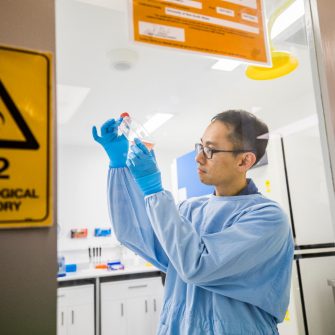Master of Engineering Science (Mechanical and Advanced Manufacturing Engineering)
- Commencing Terms
- Term 1, 2 & 3
- Duration
- 1 - 2 Year(s)
- Delivery Mode
- Face-to-face (includes blended)
- Campus
-
Kensington
- Codes
- Program code 8338
- CRICOS code 084282A
-
Commonwealth Supported Places are available for this program2026 Indicative CSP first year fee
- $9,500*
-
2026 Indicative CSP fee to complete degree
- $19,000*
-
2026 Indicative full fee to complete degree
- $61,000*
-
2026 Indicative first year full fee
- $127,000*

Application closures for 2026
International applications for all undergraduate programs, as well as postgraduate programs offered by the faculties of Arts, Design & Architecture, Engineering (excluding Master of Information Technology and associated programs) and Science are now closed to New Overseas Student Commencement (NOSC) for 2026 intakes.
Postgraduate programs offered by the Business School and the faculties of Law & Justice and Medicine & Health remain open. Master of Information Technology (and associated programs) also remain open.
- Overview
- Entry requirements
- What will I study?
- Future careers
- How to apply
- Fees & Scholarships
Overview
UNSW Master of Engineering Science (Mechanical and Advanced Manufacturing Engineering) is a two-year postgraduate degree offered at Australia’s top engineering faculty. This flexible postgraduate degree lets you specialise in mechanical engineering and gain in-depth knowledge and technical ability while continuing your professional development.
Continue to expand your knowledge through this degree to offer the best solutions to their sector. This degree allows a professional Mechanical Engineer to upgrade their skills and knowledge through rigorous and rewarding coursework that will prepare you for more specialised and senior roles.
A key element of the Master of Engineering Science (Mechanical and Advanced Manufacturing Engineering) at UNSW is core disciplinary knowledge, advanced disciplinary knowledge and an advanced research project. This postgraduate degree features complex, open-ended enquiry based projects to help you think laterally, tackle problems head on and develop the mindset to become a leader.
In this degree, you’ll gain the theory, tools and strategies to design engineering systems and manage a product’s full life-cycle. You’ll gain advanced disciplinary knowledge and practical experience in areas of:
- Computer-aided design and manufacture
- Machine condition monitoring
- Acoustics and noise
- Composite materials and mechanics
- Solar thermal energy design
- Automobile engine technology
Through an extensive research project, you’ll have the opportunity to extend your knowledge in a specific area of interest. The project enables students to gain valuable skills in project planning and management and learn methods to undertake the critical analysis, interpretation and communication of results.
Why study at UNSW?
Standout from other graduates in the job market with a degree from Australia’s top-ranking Engineering faculty. We're ranked #1 in Australia for Mechanical, Aeronautical and Manufacturing Engineering (QS World University Rankings by Subject, 2025).
We're also ranked #1 in Australia and #25 globally for Engineering and Technology. All of UNSW's Engineering schools are ranked in the global top 50 with two schools ranked in the global top 10 for Engineering subjects (QS World University Rankings by Subject, 2025).
On top of this, we're ranked #2 in Australia for Mechanical Engineering (Shanghai Ranking's Global Ranking of Academic Subjects (GRAS), 2024). As one of the largest mechanical engineering schools in Australia, we have more than 2,500 students and 90 staff members.
UNSW is known for its graduate employability, with UNSW awarded the Most Employable students for six years in a row (Australian Financial Review (AFR) Top100 Future Leaders Awards, 2020–2025).
With our global academic standing and size, benefits from studying with us include:
- Our teaching staff and researchers have expertise in a diverse set of Mechanical Engineering disciplines: aerospace, mechanical, advanced manufacturing, mechatronics and robotics
- Cutting-edge facilities including laboratories specialising in robotics, energy storage, solar thermal energy and nuclear energy
- Our School is a research powerhouse for Mechanical Engineering with strengths in Energy Conversion and Storage, Engineered Medical Solutions and Robotics and Autonomous Systems
- Partnerships with industry leaders such as Australia Advanced Aerospace Technology, Delta V – Fusion Power Systems, Hyundai NGV, The Boeing Company and Xinjiang Goldwind Science & Technology
Want to see more from UNSW Engineering?
Entry requirements
There are two entry points into this Master of Engineering Science specialisation depending on your cognate background. This provides a structured and supportive option for students with a non-cognate background, while enabling students with cognate backgrounds earlier flexibility in their course selection. Both entry points equate to the same duration of 2 years (96 UOC), and differ only in the order and structure of core foundation courses.
Students with a cognate background:
Entry into the Master’s program requires completion of a 4-year Bachelor of Engineering degree (or equivalent) or 3-year Engineering Science degree in a cognate discipline. A minimum 65% average, or its equivalent, throughout the qualifying bachelor’s degree is mandatory.*
Students with a non-cognate background:
Students with a non-cognate background can enter the Master of Engineering Science via the Graduate Certificate in Engineering Science/Master of Engineering Science pathway.
Entry into the pathway requires completion of a 4-year Bachelor of Engineering degree (or equivalent) or 3-year Engineering Science degree in any engineering discipline.
A minimum 65% average, or its equivalent, throughout the qualifying bachelor’s degree is mandatory.*
Successful applicants will be offered entry to the Master of Engineering Science via the Graduate Certificate in Engineering Science/Master of Engineering Science pathway. Students can transition to the Master of Engineering Science after passing 18 UOC of foundational courses. The total study duration is the same as the entry point for students with a cognate background (2 years/ 96 UOC). There is no separate application required for this pathway. Applicants with non-cognate backgrounds must apply for the Master of Engineering Science to be considered for this entry.
*Qualifications from non-211 Chinese Universities will require a 70% average
| Cognate Discipline | |
|
|
Recognition of Prior Learning (Credit Transfer)
Recognition of Prior Learning is the transfer of credit towards your program from previous study. If you have relevant previous study experience, you may be eligible for credit points that would enable you to complete your Master of Engineering Science in as little as one year, or another accelerated option listed below dependent on your previous study.
-
A 4 year Bachelor Degree with honours (AQF Level 8 equivalent) from any institution in a cognate discipline.
-
A 3 year Bachelor Degree (AQF Level 7 equivalent) from any institution in a cognate discipline.
English language requirements
You may be asked to provide evidence of your English proficiency to study at UNSW depending on your educational background and citizenship. English language skills are vitally important for coping with lectures, tutorials, assignments and examinations - this is why UNSW requires a minimum English language competency for enrolment.
If you’re completing an Australian Year 12 qualification (e.g. NSW HSC or equivalent), you do not need to provide anything extra to prove your proficiency. Your qualification will be used as evidence of your English proficiency.
If you do need to provide evidence of your English proficiency, this will be indicated in your application. You can prove this by providing evidence that you meet one or more of the following criteria:
- English language tests and university English courses
- Prior study in the medium of English
- Other qualifications
If you need to improve your English skills before you start your degree, UNSW College’s Academic English Programs are for you. The programs are suitable for various English levels and help you prepare for university studies and life in Australia.
For more details, visit the English Language Requirements page.
There are two entry points into this Master of Engineering Science specialisation depending on your cognate background. This provides a structured and supportive option for students with a non-cognate background, while enabling students with cognate backgrounds earlier flexibility in their course selection. Both entry points equate to the same duration of 2 years (96 UOC), and differ only in the order and structure of core foundation courses.
Students with a cognate background:
Entry into the Master’s program requires completion of a 4-year Bachelor of Engineering degree (or equivalent) or 3-year Engineering Science degree in a cognate discipline. A minimum 65% average, or its equivalent, throughout the qualifying bachelor’s degree is mandatory.*
Students with a non-cognate background:
Students with a non-cognate background can enter the Master of Engineering Science via the Graduate Certificate in Engineering Science/Master of Engineering Science pathway.
Entry into the pathway requires completion of a 4-year Bachelor of Engineering degree (or equivalent) or 3-year Engineering Science degree in any engineering discipline.
A minimum 65% average, or its equivalent, throughout the qualifying bachelor’s degree is mandatory.*
Successful applicants will be offered entry to the Master of Engineering Science via the Graduate Certificate in Engineering Science/Master of Engineering Science pathway. Students can transition to the Master of Engineering Science after passing 18 UOC of foundational courses. The total study duration is the same as the entry point for students with a cognate background (2 years/ 96 UOC). There is no separate application required for this pathway. Applicants with non-cognate backgrounds must apply for the Master of Engineering Science to be considered for this entry.
*Qualifications from non-211 Chinese Universities will require a 70% average
| Cognate Discipline | |
|
|
Recognition of Prior Learning (Credit Transfer)
Recognition of Prior Learning is the transfer of credit towards your program from previous study. If you have relevant previous study experience, you may be eligible for credit points that would enable you to complete your Master of Engineering Science in as little as one year, or another accelerated option listed below dependent on your previous study.
-
A 4 year Bachelor Degree with honours (AQF Level 8 equivalent) from any institution in a cognate discipline.
-
A 3 year Bachelor Degree (AQF Level 7 equivalent) from any institution in a cognate discipline.
Admission pathways
If you do not meet the requirements for direct entry into your chosen degree, you may be eligible for a pathway program with UNSW College. UNSW College provides alternative entry options using university-approved content so that you can start your UNSW journey with confidence.
English language requirements
You may be asked to provide evidence of your English proficiency to study at UNSW depending on whether you are from an English-speaking background or non-English speaking background. English language skills are vitally important for coping with lectures, tutorials, assignments and examinations - this is why UNSW requires a minimum English language competency for enrolment.
If English is not your first language, you’ll need to provide proof of your English proficiency before you can be given an offer to study at UNSW. You can do this by providing evidence that you meet one or more of the following criteria:
- English language tests and university English courses
- Prior study in the medium of English
- Other qualifications
If you need to improve your English skills before you start your degree, UNSW College’s Academic English Programs are for you. The programs are suitable for various English levels and help you prepare for university studies and life in Australia.
For more details, visit the English Language Requirements page.
Check the specific English language requirements for this program
What will I study?
UNSW is introducing a new academic calendar from 2028.
We are moving to a new flex-semester calendar. What does this mean for your studies?
Program structure
When you choose to study a Master of Engineering Science, you’ll choose from one of 26 specialisations which will help you make your next career move.
Within these specialisations your study will include:
- Enquiry-based courses
- Disciplinary courses
- Engineering and Technical Management Courses.
You’ll be able to tailor your degree to your interests by combining courses in your chosen specialisation with elective courses.
You’ll also have the chance to work on a complex, open-ended enquiry-based research project.
Full program structure
Degree structures can vary depending on your specialisation of choice, the number of courses you choose and timetabling, to give you an indication you can consider the below.
Depending on your specialisation and your previous studies/professional experience you may study:
- At least 4 Disciplinary Courses
- At least 4 Advanced Disciplinary Courses
- At least 1 Engineering and Technical Management Course
- At least 3 enquiry-based courses (which includes a research project)
- At least 4 elective courses (across Disciplinary, Advanced Disciplinary and Engineering and Technical Management courses)
Through the Disciplinary and Advanced Disciplinary Knowledge courses you’ll learn the technical knowledge and skills you need for your chosen specialisation. You’ll also update your knowledge in cutting-edge developments in your area of interest.
Engineering and Technical Management courses help you build skills in communicating and justifying professional decisions, employing ethical approaches to practice, and developing the abilities required for roles more focused on project and or staff management, leadership and strategy.
You’ll complete a research project in this degree within the enquiry-based courses. In this you can choose to develop your Postgraduate Research skills to assist with the research project component of the degree or as your first step towards a Higher Degree Research (PhD) program. Or you can complete a “Launching a Startup” course where you will be equipped with the skills necessary to successfully commercialise your ideas.
Future careers
Mechanical engineering is a profession that continues to evolve as technology improves and the optimisation of design and construction of machines continues. The demand for skilled engineering professionals is high, from large scale manufacturing projects to acoustics consultancies.
Mechanical Engineers work with energy, motion, forces, solids, liquids and gases and numbers. Depending on your area of interest, you can apply these skills to a range of sub-disciplines in mechanical engineering. The skills learned can be used in power generation, transport, composite structures, building services, Infrastructure and medical devices.
The skills you'll learn in Mechanical engineering will also make you a competitive graduate in technical and leadership positions across different industries, and you'll have the opportunity to diversify your engineering career to explore a range of job opportunities and career pathways.
UNSW graduates develop rewarding careers in roles such as:
- Aerospace Engineer
- Automotive Engineer
- CAD Technician
- Control and Instrumentation Engineer
- Maintenance Engineer
- Mechanical Engineer
- Nuclear Engineer
92% of Mechanical Engineers secure full-time work, compared to the national average of full-time employment of 69%.
UNSW Engineering graduates are some of the most sought-after professional engineers in Australia and abroad thanks to the reputation of our research and teaching.
How to apply
Applications must be submitted through our Apply Online portal. We encourage you to submit your completed application as early as possible to ensure it will be processed in time for your preferred term. Some high-demand programs and Faculties with limited places may have an earlier application deadline or commencement date. Find out more.
Ready to start your application?
For most international students, applications are submitted via our Apply Online service. We encourage you to submit your completed application as early as possible to ensure it will be processed in time for your preferred term.
Some high-demand programs with limited places, may have an earlier application deadline or may have an earlier commencement date. For details, visit the international admissions information page.
Ready to start your application?
Fees & Scholarships
There are a limited number of Commonwealth Supported Places (CSP) available for this degree/program. Your eligibility to receive a CSP will be automatically assessed when you apply. Please note that eligibility for Commonwealth Supported Places (CSPs) is competitive, with places awarded based on academic merit.
Start your postgraduate application today with our guide on how to apply.
Commonwealth Study Assistance such as Austudy, and Youth Allowance is available for some master’s degrees. For the most up-to-date information and list of degrees visit UNSW Current Student Financial Support.
*The indicative Commonwealth Supported Place (CSP) fees are an estimate based on the relevant student contribution band/s for a Commonwealth Supported Place undertaking a standard full-time load of 48 units of credit per year (1 Equivalent Full Time Student Load/1 EFTSL). To find out more about Commonwealth Supported Places visit Postgraduate Commonwealth Support.
Indicative fees are a guide only and have been calculated based on the typical enrolment patterns of students undertaking the degree/program. The indicative fee listed here is an estimate for tuition only and excludes non-tuition fees and charges. The amount you pay will vary depending on the calendar year of enrolment, the courses you select and whether your study load is more or less than 1 Equivalent Full Time Student Load (48 units of credit (UOC) per year).
You should not rely on indicative fees as fee increases are assessed when required and may exceed the indicative figures listed here. Actual fees are calculated on enrolment. More information on fees can be found at the UNSW fees website.
*Fees are subject to annual review by the University and may increase annually, with the new fees effective from the start of each calendar year. The indicative fees listed here are based on an estimated average and are for tuition only, other fees and charges are not included. The amount you pay will vary depending on the calendar year to enrol, the courses you select and whether your study load is more or less than 1 Equivalent Full Time Student Load (8 courses per year).
Indicative fees are a guide for comparison only based on current conditions and available data. You should not rely on indicative fees. More information on fees can be found at the UNSW fees website.
Indicative fees to complete the program have been calculated based on a percentage increase for every year of the program. Fee increases are assessed annually and may exceed the indicative figures listed here.
Indicative fees to complete the program include tuition plus an estimate of study-related costs of approximately $1,000 per year. To find out more about other costs, visit UNSW International.
Scholarships
At UNSW, we award over $83 million in scholarships each year. We pride ourselves on rewarding excellence and making university accessible to students from all walks of life. Whether you’re a domestic or international student, our range of scholarships, prizes and awards can support your journey.
Featured scholarship
The UNSW Women in Engineering Research Scholarship was established to assist women of high academic achievement with an interest in a research and/or an academic career in engineering. UNSW Engineering offers two Women in Engineering Top-up Scholarships every semester.
Apply here and search for ‘Engineering’ in the keywords.
Progress starts here – at a world-leading university

Top 20 Worldwide
Ranked in the global top 20 for three consecutive years
QS World University Rankings, 2024–2026

Winner of the AFR Most Employable University Award six years in a row
AFR Top100 Future Leaders Awards, 2020–2025

Australia's #1 for Innovation
Highest number of startups and spinouts from university-developed tech
SCOPR report, 2024




